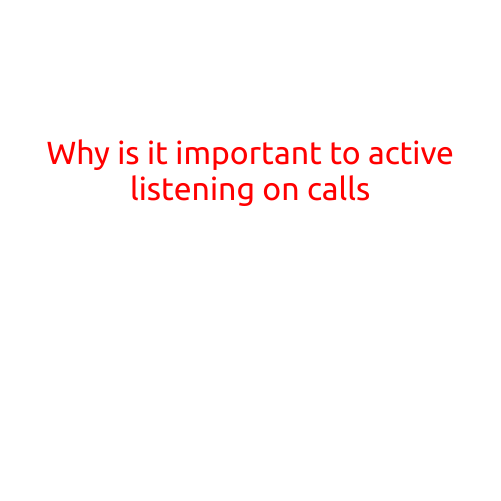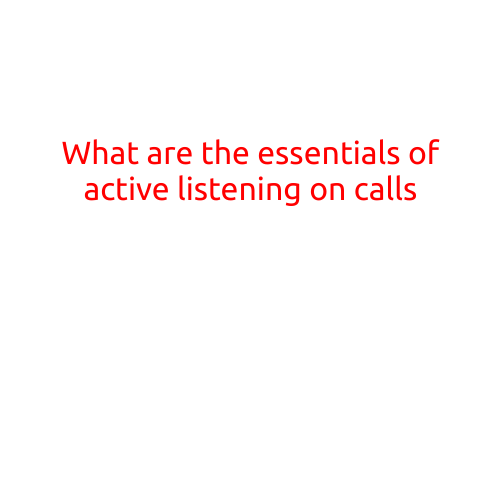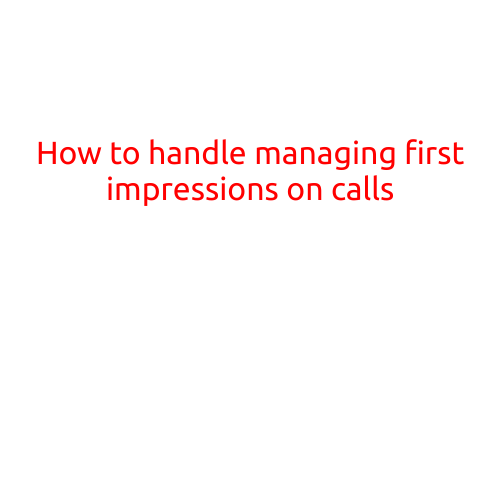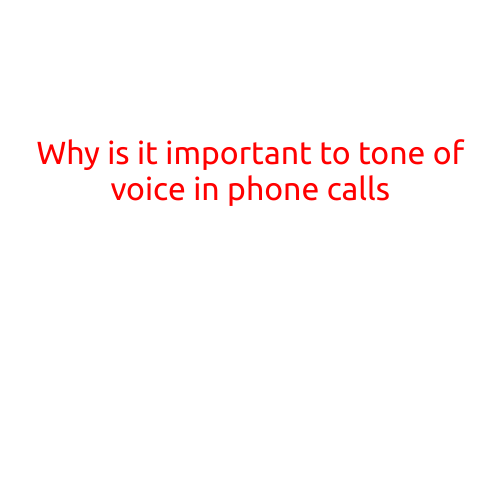
Why is it Important to Practice Active Listening on Calls?
Effective communication is the backbone of any successful business, and in today’s digital age, phone calls play a vital role in it. With the increasing importance of remote work, virtual teams, and customer service, phone calls have become a crucial tool for building relationships, resolving issues, and driving business outcomes. However, many of us are guilty of not using this channel optimally, which can lead to misunderstandings, miscommunication, and ultimately, lost opportunities. In this article, we’ll explore the significance of active listening on calls and how it can transform the way we communicate.
What is Active Listening?
Active listening is a crucial skill that involves fully concentrating on the speaker, understanding their message, and showing that you’re engaged in the conversation. It’s not just about hearing the words; it’s about comprehending the emotions, tone, and intent behind them. Active listeners focus on the speaker, ask clarifying questions, and respond thoughtfully, ensuring that they understand the message correctly.
Why is Active Listening Important on Calls?
- Improved Understanding: Active listening helps you grasp the speaker’s message correctly, reducing the likelihood of misinterpretation and misunderstandings. This enables you to provide accurate solutions, make informed decisions, and build trust with the caller.
- Enhanced Relationships: By showing that you’re genuinely interested in the caller’s concerns and needs, you build rapport and establish a stronger connection. This rapport can lead to increased customer loyalty, higher satisfaction rates, and even repeat business.
- Increased Efficiency: Active listening helps you stay focused on the conversation, which can reduce the time spent on calls and improve the overall efficiency of your communication. By clarifying doubts and misunderstanding early on, you can resolve issues quicker and move on to the next task.
- Better Problem-Solving: When you’re actively listening, you’re better equipped to understand the root cause of a problem and provide a more accurate solution. This leads to higher problem-solving rates, reduced callbacks, and increased customer satisfaction.
- Reduced Miscommunication: Active listening reduces the risk of miscommunication, which can lead to costly mistakes, reputational damage, and lost opportunities. By ensuring that you understand the message correctly, you can avoid misunderstandings and conflicts.
Tips for Active Listening on Calls
- Give the Speaker Your Undivided Attention: Put away distractions, such as emails, chats, or documents, and focus solely on the conversation.
- Use Verbal Cues: Use verbal cues like “I understand” or “Can you expand on that?” to show that you’re engaged and interested in the conversation.
- Ask Clarifying Questions: Don’t be afraid to ask questions to clarify doubts or misunderstandings. This helps ensure that you understand the message correctly.
- Avoid Interrupting: Allow the speaker to finish their sentence before responding. Interrupting can lead to misunderstandings and make the caller feel unheard.
- Practice Active Listening in Real-Life Situations: Don’t just reserve active listening for work calls. Practice it in personal conversations, too, and you’ll see improvement in your communication skills.
Conclusion
Active listening is a vital skill that can transform the way you communicate on calls. By practicing active listening, you can improve understanding, enhance relationships, increase efficiency, better problem-solve, and reduce miscommunication. Remember, effective communication is the key to success in any business or personal relationship, and active listening is a powerful tool to achieve that. So, next time you’re on a call, make sure to put these tips into practice and unlock the full potential of your communication skills.





